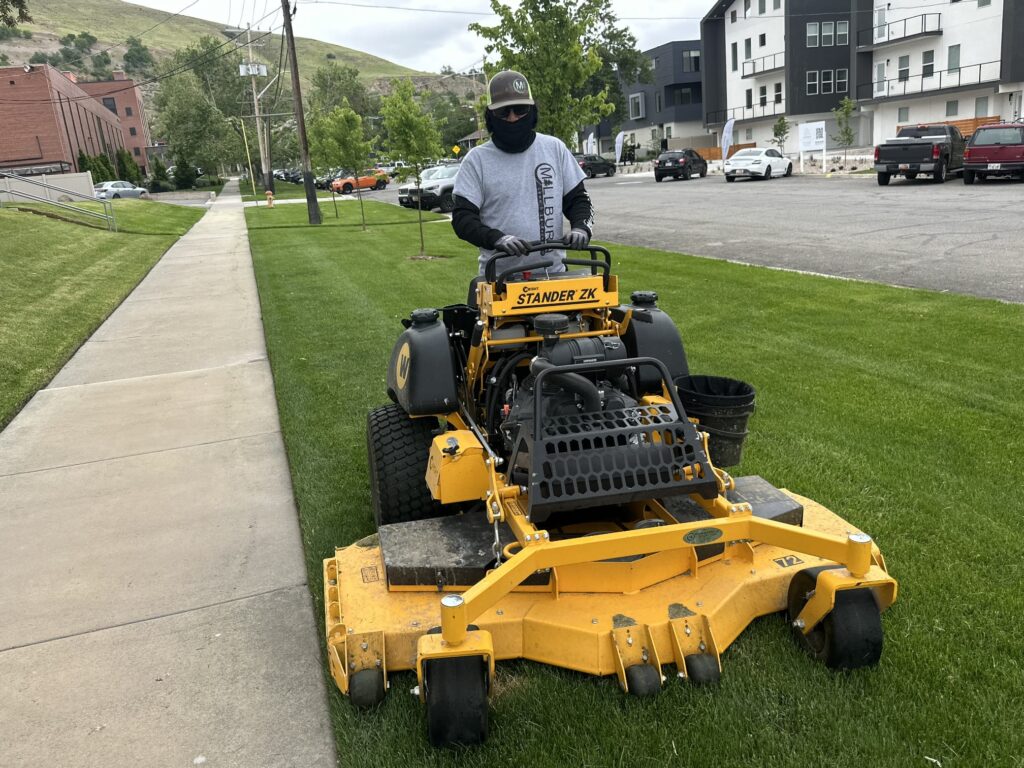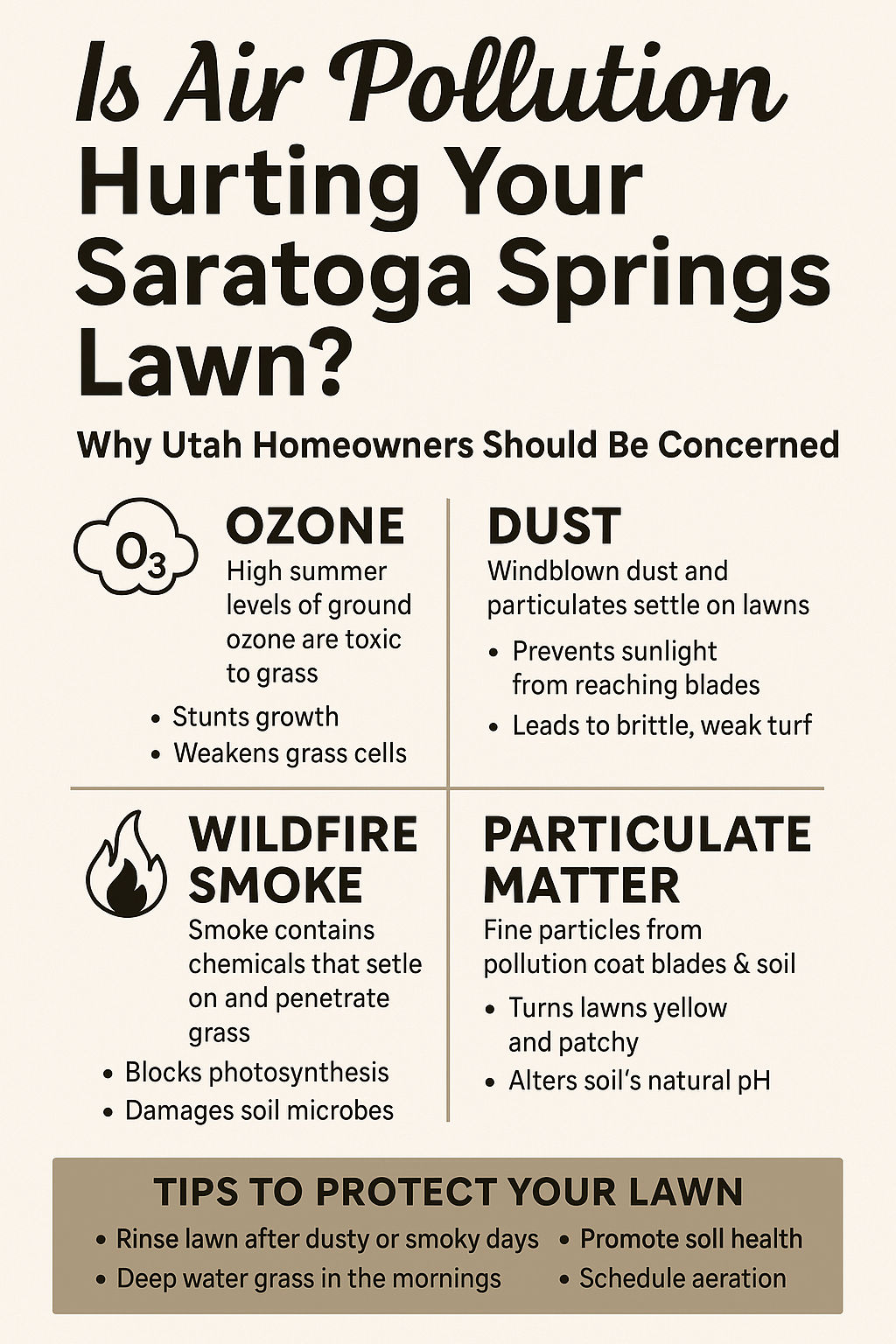Is Air Pollution Hurting Your Saratoga Springs Lawn? What Utah Homeowners Need to Know
When you think of air pollution in Utah, you probably picture hazy skies and health warnings during winter inversions or wildfire season. But what many homeowners in Saratoga Springs don’t realize is that air pollution can directly harm your lawn—reducing its color, weakening roots, and inviting long-term turf decline.
Here’s how ozone, dust, wildfire smoke, and particulate matter are silently stressing your grass and what you can do about it.
How Ozone Affects Grass in Utah
Ground-level ozone isn’t just harmful to human lungs—it’s also toxic to grass blades. During hot summer days, especially in Saratoga Springs, elevated ozone levels interact with your lawn’s surface, reducing photosynthesis and weakening grass cells.
High ozone = low resilience. This means your lawn becomes more vulnerable to heatwaves, pests, and foot traffic stress.
✅ Tip: Deep watering and mowing in the morning can reduce additional stress on ozone-exposed lawns.
Dust and Particulate Matter: Silent Turf Killers
Living in Utah means dealing with windblown dust, construction debris, and fine particulate matter that settles on everything—including your lawn. Over time, this layer:
- Blocks sunlight from reaching the grass blades
- Alters the soil’s pH balance
- Increases compaction and water runoff
This is especially common in developing neighborhoods like those in Saratoga Springs, where new builds and roadwork kick up extra debris.
Wildfire Smoke: A Threat Beyond the Air You Breathe
Think smoke only affects the sky? Think again.
Wildfire smoke contains carbon particles and chemical residues that:
- Settle into the soil and disrupt microbial activity
- Reduce UV light penetration, slowing growth
- Leave a film on grass blades that hampers photosynthesis
During prolonged wildfire events, lawns often develop yellow patches, stunted growth, and weak root systems—not from drought, but from airborne toxins.
Ozone Lawn Stress + Utah Inversion Traps
During a winter inversion, cold air traps pollutants close to the ground, directly exposing your lawn to high concentrations of ozone and particulates. The stress builds slowly and silently, weakening the lawn’s overall resilience heading into spring.
Combine this with compacted snow or frozen soil, and the result is patchy, struggling turf by April.
Soil Health and Air Quality: The Overlooked Connection
The microorganisms in your lawn’s soil are vital to nutrient uptake and water retention. But exposure to consistent air pollution—especially from vehicle emissions and construction zones—can alter microbial communities, reducing the efficiency of your lawn’s natural growth cycle.
➡️ Poor air = Poor soil = Poor grass
➡️ Which means your lush green yard becomes a brittle, brown mess by mid-summer.
How to Protect Your Saratoga Springs Lawn from Air Pollution
You can’t change the air quality, but you can help your lawn fight back:
- Rinse your lawn lightly after smoky days or dust storms to remove residue
- Aerate the soil in spring and fall to promote airflow and root strength
- Apply organic topdressing or compost to support microbial health
- Use smart watering during ozone peaks—early morning is best
- Schedule consistent mowing with sharp blades (avoid cutting more than 1/3 the blade)
For reliable weekly mowing and expert soil-friendly practices, check out our lawn mowing services in Saratoga Springs.

Don’t let invisible pollutants destroy your curb appeal. Book a professional lawn evaluation today and learn how our local team protects your yard against Utah’s harshest environmental stressors.
📞 Call 801-810-5452 or click here to schedule your service.
FAQs
Q: Can air pollution really damage my grass in Saratoga Springs?
Yes! Ozone, smoke, and particulates can stunt growth, block sunlight, and damage soil microbes vital for turf health.
Q: How can I tell if it’s pollution or drought causing lawn issues?
Pollution damage often appears as random yellow patches, a powdery film on blades, or weak root pull. Drought causes more uniform browning.
Q: Should I hose down my lawn after smoky days?
Absolutely. A light rinse helps remove particulates that block sunlight and damage grass cells.
Q: Can landscaping services help with this?
Yes—our team uses tools and techniques designed for Utah’s unique air and soil challenges, especially in fast-growing areas like Saratoga Springs.


